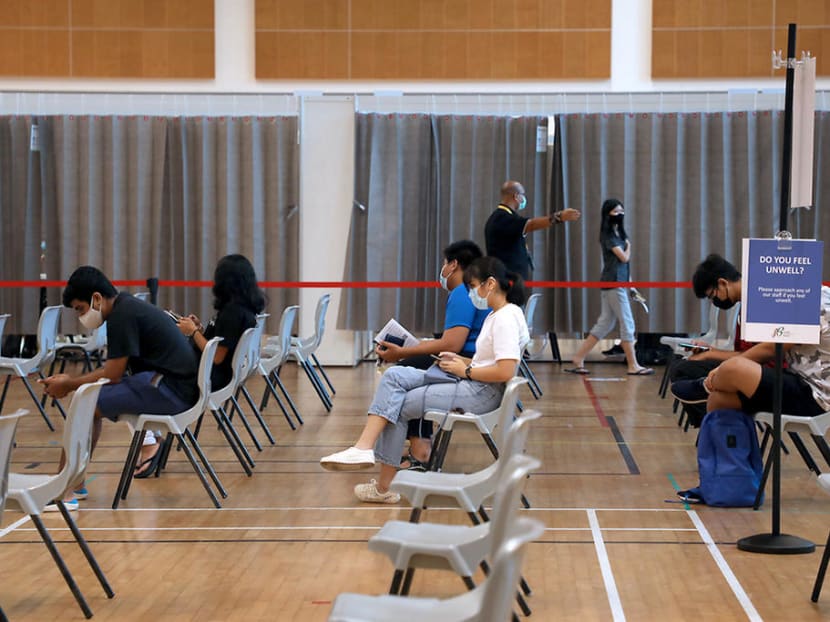Younger persons should avoid strenuous physical activity for 2 weeks, instead of just 1, after either dose of Covid-19 vaccine: Expert committee
SINGAPORE — Teenagers and young adults who have taken any dose of the Covid-19 mRNA vaccine should avoid strenuous physical activities for two weeks, the expert committee on Covid-19 vaccination said on Thursday (Sept 16).

The Health Sciences Authority has started receiving reports of some vaccinated individuals developing myocarditis or pericarditis within the second week of getting their shots.
- Teenagers and young adults who have taken a dose of Covid-19 mRNA vaccine should avoid strenuous physical activities for two weeks
- The Health Sciences Authority has started receiving reports of vaccinated persons developing myocarditis or pericarditis within the second week of a jab
- Those who took an mRNA vaccine and developed delayed non-severe skin reactions are eligible to take subsequent doses of the same vaccine
- This applies to those who had non-specific skin symptoms after taking an mRNA vaccine as well
- Previously, they were not eligible for their second dose of the mRNA vaccine after developing such skin-related symptoms after their first jab
SINGAPORE — Teenagers and young adults who have taken any dose of the Covid-19 mRNA vaccine should avoid strenuous physical activities for two weeks, the expert committee on Covid-19 vaccination said on Thursday (Sept 16).
The advisory is an update from the recommendation that these people should avoid strenuous activities for a week.
In a media statement on Thursday, the committee said that the Health Sciences Authority (HSA) has started receiving reports of some vaccinated individuals developing myocarditis or pericarditis within the second week of being jabbed.
Myocarditis and pericarditis both refer to the inflammation of some part of the heart.
Most of such cases previously reported had occurred within one week of being vaccinated.
It advised individuals to seek medical attention promptly if they develop chest pain, shortness of breath or palpitations following any dose of the vaccines.
The Committee said that data here and overseas show that there is a small risk that people who have received the messenger ribonucleic acid (mRNA) vaccines can develop myocarditis or pericarditis, especially among younger populations and after the second dose.
The rate of such occurrences among those who have received both doses here was 1.06 out of 100,000 doses administered, but it increased to 4.84 among under-30 males who took their second jab. This data is from an HSA report covering the period December 2020 to July 31 this year.
In the previous HSA update for the situation from December 2020 till July 31, the overall local incidence rate was 0.48 per 100,000 doses administered, and the incidence rate in males below 30 years old was 2.36 per 100,000 doses administered.
“Myocarditis and pericarditis after vaccination are rare, but occurrence tends to be higher in young males aged 30 years and below,” the Committee said.
It added that most cases of myocarditis in the younger age group here have been mild.
They have responded well to treatment and are recovering or have been discharged well from the hospital.
In its fifth safety update also released on the same day, HSA said that it has received 65 reports of myocarditis and pericarditis here after more than 8.5 million doses of mRNA vaccines were administered.
This is almost double the 34 cases last month, of which 20 were males below 30.
For this month, there were 40 cases (62 per cent) that occurred among people younger than 30, out of which 36 (90 per cent) were in males.
Forty-three cases (66 per cent) were reported after the second mRNA vaccine.
Most were reported to occur within a week after receiving the vaccine, but 12 (18 per cent) had occurred more than a week after vaccination.
SKIN REACTIONS
The committee also said in its statement that individuals who took an mRNA vaccine and either developed delayed non-severe skin reactions or had non-specific skin symptoms may be suitable for subsequent doses of the same vaccine.
Previously, individuals who developed mild or non-specific skin reactions after going for their first jab were not eligible for their second dose of the mRNA vaccine.
However, in view of international evidence and local experience, the committee has reviewed this and said that those who developed non-severe skin reactions after more than four hours of their first vaccine, and do not have any other symptoms, can now get their second jab or a booster shot.
The same goes for those who had flare-ups of underlying skin conditions such as psoriasis and eczema, as well as those who had non-specific skin symptoms such as itching without a rash, a red patch beyond the injection site or eczema.
“This will allow more persons, particularly those with minor or non-specific past reactions, to safely complete vaccination,” it said.
These individuals are encouraged to return to their previous vaccination sites so that they can be reassessed for their eligibility in completing their vaccination.











